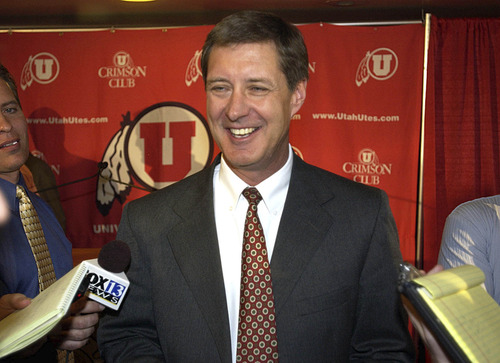This is an archived article that was published on sltrib.com in 2013, and information in the article may be outdated. It is provided only for personal research purposes and may not be reprinted.
While the Utah Utes are benefiting from a substantial increase in profit from TV shares as a Pac-12 member, the school isn't exactly enjoying a huge savings account.
If anything, the athletic program is strapped more now than ever, according to Utah athletic director Chris Hill.
According to the Pac-12's tax filings for the 2011-12 year, which were obtained by the San Jose Mercury News, the Utes made $4,079,028 in revenue for the 2011-12 fiscal year, a period in which they received only a partial cut of new money brought into the league that was generated by their move from the Mountain West Conference to the Pac-12.
The Utes received a 50 percent share last year, will receive a 75 percent share in 2013-14 and will be a full member for the 2014-15 year.
While Utah's amount is far below the profit enjoyed by Stanford and Oregon, which led the league with $15,651,602 and $15,200,450 in revenue, respectively, Utah's haul is much higher than it was getting in the MWC, where $1.2 million was considered a good amount.
The majority of Utah's money came from the Pac-12's TV deal with ESPN and Fox.
Hill predicted a lean year as a result of Utah's terms with the Pac-12, but felt it was the right thing to do so the Utes could join the league as soon as possible.
However, getting little revenue and pumping out more than $64.2 million for facility construction or renovations left the Utes with a thin bank account, Hill said.
"For the first time ever, we went into the hole last year and used up our reserve fund," Hill said of the roughly $2 million set aside in the fund. "We want to make sure we don't fall far behind, so the hope is we can break even this year. We have to invest more in facilities and that is the biggest challenge we have: getting people to understand we do have more money coming in, but why we keep saying we need more. Sometimes that is a hard message to get across."
Hill has committed such a large chunk of money and fundraising efforts to the new facilities because he felt it was the most crucial area to bring the Utes up to speed with the rest of the Pac-12.
He said he can't expect his coaches to recruit against the best teams in the league with poor facilities.
So far the Utes have dedicated $32 million to the new football facility, $24 million to a basketball facility, $4.2 million to the new softball complex, $2.5 million in track upgrades and $1.5 million for an outdoor tennis facility.
"We know it's going to take a while to be successful in the Pac-12 and we just came through one of our toughest times when we didn't get any money moving to the Pac-12, but there were certain things we had to do," he said. "We had to make some big investments, but by year 4, we are going to be on our way to being in the middle of the league or better by the standard of most facilities."
Hill said he plans to continue increasing fundraising efforts such as hitting up former athletes for donations as Utah continues to play catch-up to the rest of the league. It's a slow process, but the Utes are getting there, he said.
"We are in year 3," he said of the Utes' presence in the Pac-12. "Every part of us is transitioning and we are going to do it right, but it's going to take a little time to do it." —
Pac-12 revenue figures for 2011-12
Stanford • $15,651,602
Oregon • $15,200,450
Washington • $13,520,128
USC • $13,464,426
UCLA • $12,753,358
Arizona State • $12,029,443
Cal • $11,595,746
Washington State • $10,564,842
Arizona • $10,562,878
Oregon State • $10,043,205
Utah • $4,079,028 (new member, partial cut)
Colorado • $3,413,697 (new member, partial)
Source • San Jose Mercury News



